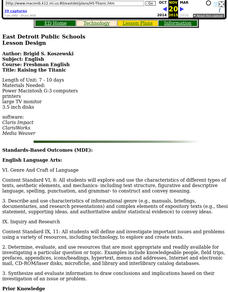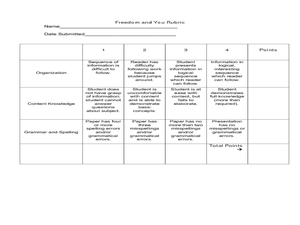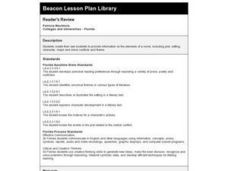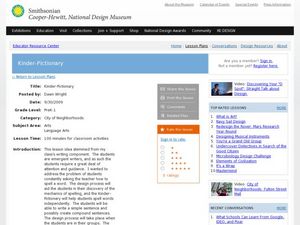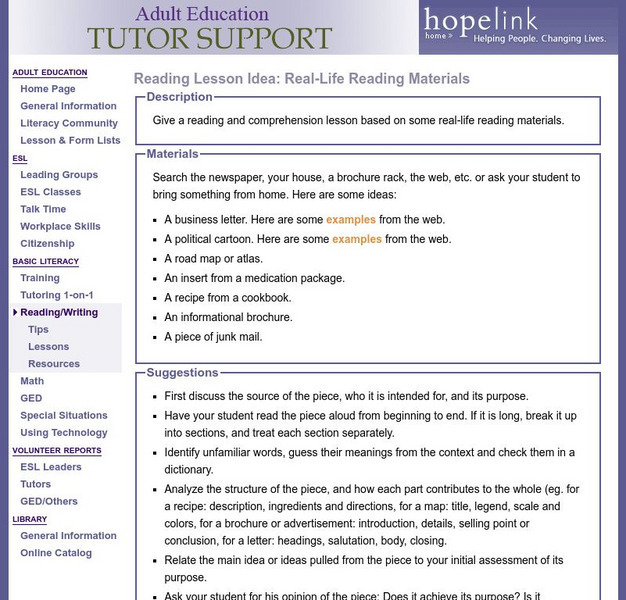Curated OER
Let Me Tell You About My Favorite Animal
Students create books about their favorite animals using graphic organizers.
Curated OER
Raising the Titanic
Ninth graders research the history of a person who was aboard the Titanic and write about the part he/she played in the world's greatest maritime disaster.
Curated OER
Freedom and You
Students research the American Revolution. In this Revolutionary War activity, students research facts about the American Revolution, write an expository essay, and peer edit for good content. The paper is suggested to be written after...
Curated OER
Radical Reads
Students recreate an "American Idol" contest in which they present their favorite books to their classmates using arguments for and excerpts from the books. Following the presentation, students will be polled and the least popular books...
Curated OER
Voices at Whisper Bend
High schoolers examine life in Pennsylvania during and after World War II. Using primary source documents, they compare the unity of the United States during World War II and the Iraq War. They also discover how citizens adapt to the war...
Curated OER
Weather Records
Students write newspaper articles based on weather records set around the world. Students read and discuss weather records and their results, then write a newspaper article about how the weather records have affected people around the...
Curated OER
Comparing Weather Conditions
Young scholars conduct research on temperature, wind speed and weather conditions from a variety of areas. They organize their findings on worksheets and spreadsheets and discuss various examples of databases.
Curated OER
Coral Reefs
Students examine the animals that live in a coral reef and how they adapt to their environment. In this coral lesson students write a short book on how animals inhabit the coral reefs.
Curated OER
Wolves
Students utilize several different sources to research wolves, after completing the K-W-L process.
Curated OER
Reader's Review
Pupils create booklets to provide information on elements of a novel, including plot, setting, character, major and minor conflicts and theme.
Curated OER
How Logical is Garfield?
Third graders analyze comics found in the newspaper for samples of logical, emotional, and ethical appeal. They write a paragraph for each selected comic strip explaining how the comic strip represents the use of logic, emotions, or ethics.
Curated OER
Night by Elie Weisel
Students read "No News from Auschwitz" and answer the study questions as an introduction to the novel. They record reactions to the essay and compare with reactions after reading "Night".
Curated OER
Kinder-Pictionary
Students create their own dictionary. In this spelling lesson, students make a dictionary with just words and pictures. They use these dictionaries when they are writing to remember how to spell words.
Curated OER
The Human Jigsaw
Fourth graders, using Thomas Paine's "The Crisis, No. 1" from The American Crisis, form a human jigsaw.
Curated OER
Evaluate Problem-Solving in the Context of Culture and Time-frame
Students examine literary elements in non-fiction literature. In this problem solving lesson, students read Rosa Parks, My Story and Beyond the Limits. Students make oral presentations based on the causes and effects, conflicts, and...
Curated OER
Reporting Live From...
Students examine the many disasters in West Virginia. In this US history lesson, students write about and give an oral presentation of one of the disasters as if they were reporters.
Curated OER
Author, Author!
Third graders, in groups, select and research a favorite studenT author or illustrator. They answer questions about the author, conduct research and prepare a PowerPoint presentation with their findings.
Curated OER
Memories
Fifth graders collect artifacts of their fifth grade school year and make a technology based Memory Book.
TES Global
Tes: Analyzing & Comparing Non Fiction
[Free Registration/Login Required] Resource notes to aid students as they analyze different types of nonfiction. The GAP (genre, audience, and purpose) acronym is provided to use when comparing nonfiction texts.
Hopelink
Hopelink: Reading Lesson Idea: Real Life Reading Materials
The purpose of this reading lesson is to offer a reading and comprehension lesson based on real-life reading materials. This gives students the opportunity to gain reading comprehension skills from real-life reading material.
Better Lesson
Better Lesson: Shadows Shadows Everywhere!
Shadows are all around us.Students will use reading comprehension strategies to distinguish between fantasy and reality.

